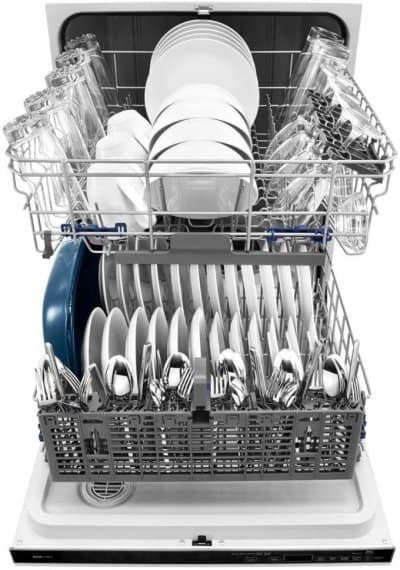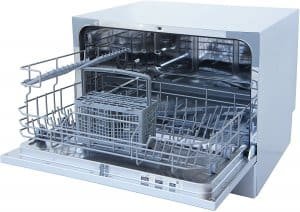Dishwashing is an essential part of our daily routine, and it can be a time-consuming and tedious task. With the invention of dishwashers, the question of whether they are cheaper than hand washing arises. There are many factors to consider when comparing the costs of these two methods of dishwashing. In this article, we will explore the costs associated with dishwashers and hand washing, the environmental impact, and the benefits and drawbacks of each method.
Table of Contents
Costs Associated with Dishwashers
The initial cost of purchasing a dishwasher can be high, ranging from a few hundred to thousands of dollars depending on the model and brand. However, the cost of a dishwasher can be amortized over its lifetime, which can range from 7 to 15 years. In addition to the initial cost, there are also costs associated with running a dishwasher, such as electricity, water, and detergent.
- Electricity:
The cost of electricity to run a dishwasher varies depending on the model and energy efficiency. According to Energy Star, a standard dishwasher uses about 1.5 kilowatt-hours (kWh) of electricity per load, which translates to about $0.14 per load based on an average electricity rate of $0.09 per kWh. However, Energy Star-certified dishwashers are more energy-efficient and use less electricity, reducing the cost to about $0.11 per load.
- Water:
The amount of water used by a dishwasher also varies depending on the model and settings. According to Energy Star, a standard dishwasher uses about 4 gallons of water per load, which translates to about $0.05 per load based on an average water rate of $0.0125 per gallon. Energy Star-certified dishwashers use less water, reducing the cost to about $0.03 per load.
- Detergent:
The cost of detergent also varies depending on the brand and type. According to Consumer Reports, the average cost of dishwasher detergent is about $0.15 per load.

Costs Associated with Hand Washing
Hand washing dishes can be a cost-effective method, as it does not require the purchase of a dishwasher. However, there are still costs associated with hand washing, such as water, electricity, and detergent.
- Water:
The amount of water used in hand washing dishes can vary depending on the method used. According to the Environmental Protection Agency (EPA), hand washing dishes in a filled sink can use about 4 gallons of water, which translates to about $0.05 per load based on an average water rate of $0.0125 per gallon.
- Electricity:
The cost of electricity to heat the water used for hand washing dishes can vary depending on the method used. According to the EPA, heating 4 gallons of water to 120°F can cost about $0.12 per load based on an average electricity rate of $0.09 per kWh.
- Detergent:
The cost of detergent for hand washing dishes also varies depending on the brand and type. According to Consumer Reports, the average cost of dish soap is about $0.10 per load.
Comparing the Costs of Dishwashers and Hand Washing
To compare the costs of dishwashers and hand washing, we can consider the total cost per load of dishes washed.
- Dishwashers:
Based on the costs outlined above, the total cost per load for running a standard dishwasher is about $0.30 per load, while the total cost per load for running an Energy Star-certified dishwasher is about $0.25 per load.
- Hand washing:
Based on the costs outlined above, the total cost per load for hand washing dishes in a filled sink with hot water and dish soap is about $0.22 per load.
Is Dishwasher Cheaper than Hand Washing?
Generally, dishwashers are cheaper than hand washing dishes. Dishwashers use less water and electricity than hand washing, and they can also clean more dishes at once. This means that you can save money on your utility bills since you don’t have to use as much energy or water to get the job done. Additionally, dishwashers require fewer cleaning supplies than hand washing, so you’ll save money on those as well. Overall, the cost savings from using a dishwasher make it a much more economical choice than hand washing dishes.
FAQs:
Is it cheaper to run a dishwasher or wash dishes by hand?
Based on the costs outlined above, it is slightly cheaper to hand wash dishes in a filled sink with hot water and dish soap, compared to running a standard dishwasher. However, running an Energy Star-certified dishwasher is more cost-effective than hand washing.
Is hand washing dishes more environmentally friendly than using a dishwasher?
Hand washing dishes can use less water than a dishwasher, but it can also use more energy to heat the water. Additionally, hand washing can result in more water being wasted due to rinsing dishes, while dishwashers use less water by using efficient spray patterns. However, dishwashers require electricity to run, which can contribute to greenhouse gas emissions. In general, it is difficult to determine which method is more environmentally friendly, as it depends on the specific circumstances and habits of the user.
How often should I run my dishwasher?
It is recommended to run your dishwasher when it is full, rather than running partial loads. Running your dishwasher less frequently can save on water and energy costs.
Can I hand wash dishes and then use the dishwasher to sanitize them?
Some dishwashers have a sanitize cycle that uses high heat to kill bacteria, but this cycle may not be effective if the dishes are not properly cleaned beforehand. It is generally recommended to either hand wash or use the dishwasher to wash and sanitize dishes, rather than a combination of both.
Can dishwashers damage certain types of dishes?
Some materials, such as delicate glassware and certain types of plastics, may not be dishwasher safe and can be damaged by the high heat and pressure. It is important to check the manufacturer’s instructions and guidelines before putting dishes in the dishwasher.
Conclusion
The decision of whether to use a dishwasher or hand wash dishes depends on various factors, including cost, convenience, and environmental impact. While hand washing can be slightly cheaper per load, a more energy-efficient dishwasher can save on water and energy costs in the long run. Ultimately, it is important to weigh the pros and cons of each method and consider personal preferences and habits.

